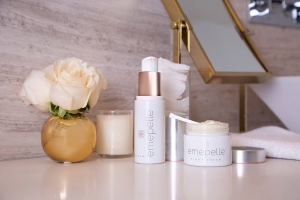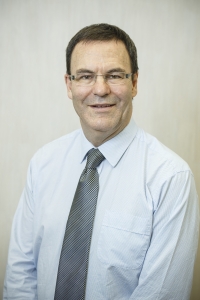Skincare for Women 45+
Did you know that a woman’s skin ages more quickly after menopause than at any other time in her life?
30% of the skin’s collagen is lost within the first 5 years of menopause, due to low oestrogen levels. During this time a woman skin ages more quickly than at any other stage of her life. Menopause can cause skin dryness, laxity, wrinkling and dullness.
Emepelle with MEP Technology is clinically proven to significantly improve the visible signs of skin ageing. Emepelle is the first and only skincare range which targets accelerated collagen loss and skin ageing caused by menopause.
Emepelle Serum is suitable for all skin types. It safely and effectively targets accelerated collagen loss and skin ageing caused by menopause and can be used morning and night in conjunction with your usual skin care routine.
We now have an innovative technology, maximise hydration and pamper your skin with the rich formula of Emepelle Night Cream, suitable for all skin types.
Both Emepelle Serum® and Emepelle Night Cream® are available to purchase from our rooms. Call us on 02 92211477 for more details.
New appointment
Congratulations to Associate Professor Stephen Shumack on election to the Board of the International League of Dermatological Societies (ILDS), during the 24th World Congress of Dermatology. WCD2019 had 16 000 attendees from around the globe.
The ILDS is worlds largest and oldest organisation dedicated to global dermatology. #SkinHealth4theWorld
Practice update
Thank you to all our patients and referring doctors and your loyalty over the past year. We would like to take this opportunity to give everyone an update on what is happening in the practice.
We welcomed Dr Sue Ng back from maternity leave in mid March. Sue, her husband and daughter have welcomed two beautiful boys to their family. Dr Erin Mullan has increased her hours at the practice and will now be here most Thursdays as well as Tuesdays.
Dermatologists
Dr Jo-Ann See works Mondays and Wednesdays, mornings and afternoons.
Dr Sue Ng is here Mondays, morning and afternoon.
A/Prof Stephen Shumack works Tuesdays morning and afternoon, Thursday’s afternoon only.
Dr Erin Mullan works Tuesday, morning and afternoon and three out of four Thursdays morning and afternoon.
Dr Penny Lee is here every fourth Thursday, morning and afternoon (when Dr Mullan is not here)
Dr Terence Poon works every Friday, mainly morning session, finishing at 2pm. He also works some Wednesdays.
We have five experienced Dermatology Registered Nurses who are here between 8am and 3:30pm are able to assist with most enquiries regarding your treatment when your treating Dermatologist is not in attendance.
Have you had your skin check this summer?
Melanoma is the fourth most common cancer in Australia. One person for every 120 will risk death from melanoma skin cancer by their 85th birthday, and 1 in every 18 being diagnosed with melanoma at some stage before the age of 85.
The good news is that if melanoma is identified at an early stage, simple treatment can bring good results. Whilst there have been significant improvements in treatment options for advanced melanoma over the last few years, prevention measures and early detection of new melanomas remain our best chance to reduce mortality.
National Skin Cancer Action Week
Research released this week shows that only 44% of Australian adults are wearing hats when exposed to UV rays, and we’re not seeking the shade during peak UV times. On a positive note we are more likely to use sunscreen.
In light of the findings the Cancer Council and the Australasian College of Dermatologists are reminding Australians to Slip Slop Slap Seek and Slide.
Only 1 in 5 Adults are using three or more sun protective measures. There is a tendency towards applying sunscreen in the morning and thinking you are protected all day, but sunscreen should be the last line of defence.
The most common places that get burnt are the face, head, nose and ears, along with hands and arms. By neglecting to wear a broadbrim hat Aussies are putting themselves at risk.
Dermatologists are regularly treating skin cancers that could have been prevented by using sun protective measures:
![]() Choose clothing that covers your arms and shoulders
Choose clothing that covers your arms and shoulders
![]() Use sunscreen with an SPF 30 or above
Use sunscreen with an SPF 30 or above
Unfortunately living in this lovely country means that two in three Australians will be diagnosed with skin cancer by the age of 70, and we spend more than $1 billion per year treating skin cancer.
Early detection is important, skin cancers can often be treated successfully if spotted early enough. Get to know your skin, what is normal for you and keep an eye out for changes. If you get a new spot or something changes in size, shape or colour get it checked out by your General Practitioner or Dermatologist.
Annual Scientific Meeting of the Australasian College of Dermatology
As part of their ongoing professional education, our dermatologists and nurses recently attended the Annual Scientific Meeting of the Australasian College of Dermatologists held in Perth. Highlights for Central Sydney Dermatology was the induction of our very own Dr Erin Mullan as a Fellow of College and our senior nurse Cathy Corry being awarded the ADNA travelling scholarship to attend the New Zealand dermatological nurses conference in August this year.
International speakers presented updates on a wide range of dermatological conditions including melanoma, skin cancer, acne, psoriasis and eczema.
The Australasian Society of Cosmetic Dermatologists annual meeting was also held concurrently. Updates on laser, injectable treatments and the rejuvenation of sun damage were among the topics presented and discussed.


